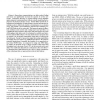352 search results - page 5 / 71 » Capacity and Delay Tradeoffs for Ad-Hoc Mobile Networks |
103
click to vote
ADT
2008
15 years 1 months ago
2008
This paper analyzes voice transmission capacity on IEEE 802.11 ad hoc networks by performing simulations related to delay, jitter, loss rate, and consecutive losses. We evaluate th...
107
click to vote
CORR
2007
Springer
15 years 1 months ago
2007
Springer
The subject of this article is the long standing open problem of developing a general capacity theory for wireless networks, particularly a theory capable of describing the fundam...
125
click to vote
COMCOM
2008
15 years 1 months ago
2008
In this paper, we present Collaborative Opportunistic Recovery Algorithm (CORA) designed for multicast multimedia applications with low loss as well as latency constraints in ad h...
115
Voted
ISCC
2007
IEEE
15 years 8 months ago
2007
IEEE
Many methods for end-to-end bandwidth estimation on wired networks assume that link capacities are constant and that all cross-traffic interaction occurs through queuing delays at...
140
click to vote
INFOCOM
2006
IEEE
15 years 7 months ago
2006
IEEE
— Space-time communications can help combat fading and hence can significantly increase the capacity of ad hoc networks. Cooperative diversity or virtual antenna arrays facilita...

